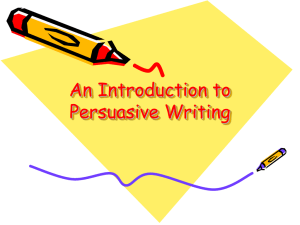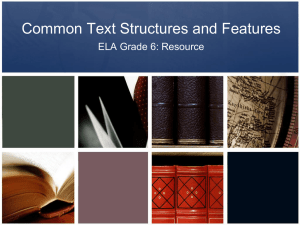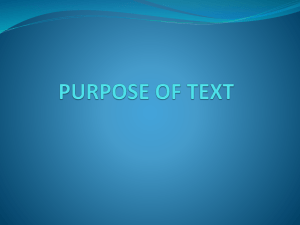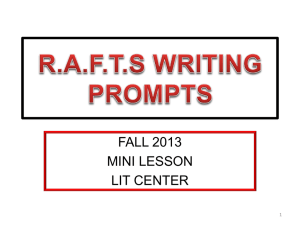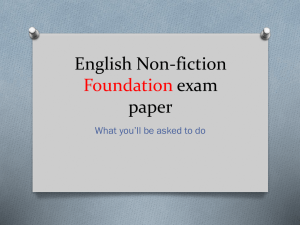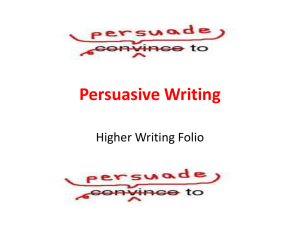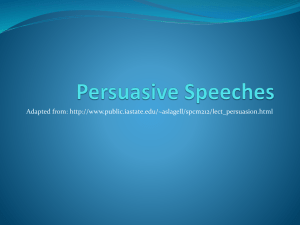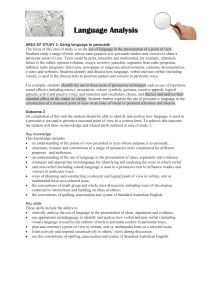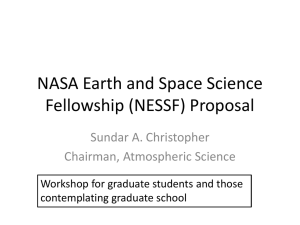effective-writing-style-advice-for-preparing-proposals
advertisement
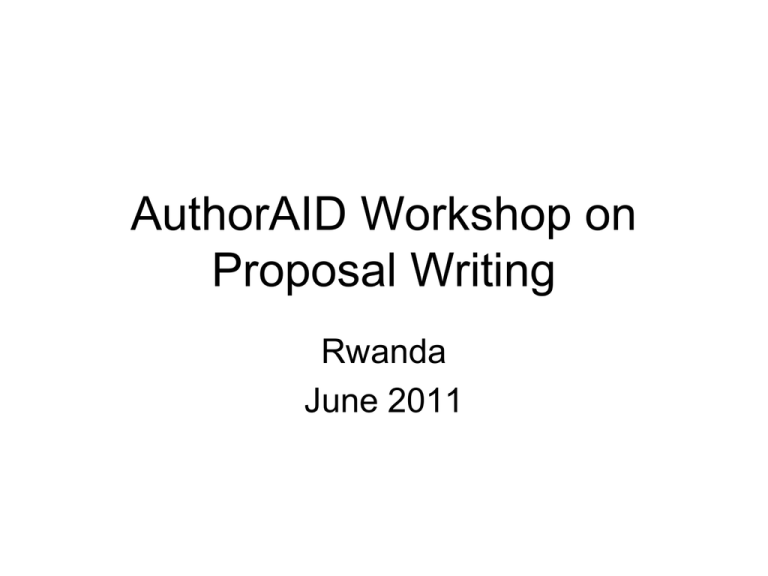
AuthorAID Workshop on Proposal Writing Rwanda June 2011 Effective Writing Style: Advice for Preparing Proposals Ravi Murugesan, MS, ELS AuthorAID Training Coordinator rmurugesan@inasp.info Importance of Writing Style • A written proposal is your only medium for communicating what you want to do. – Granting bodies may not have time to discuss your proposal with you. – They usually make a decision after reading your proposal. • Winning proposals have good ideas that are communicated well. Key Elements of Writing Style • Your writing in a proposal should be: – Clear – Concise – Persuasive – Well-formatted Writing Clearly • When you write your proposal, assume that the reader (grant reviewer): – Does not know the context or situation in which you are working. – Will not immediately understand the importance of your project. Writing Clearly (cont) • Keep the grant reviewer in mind when you write. • Follow basic principles to maintain clarity: – Provide overviews before details. – If tables and figures are used, design them for easy understanding. – Expand abbreviations / acronyms. – Explain difficult terminology or concepts. Writing Clearly (cont) • Check whether your writing is clear by showing your proposal to a colleague or friend. • Ask if he/she can – Spot any unclear parts. – Understand the results you hope to achieve. – Understand the importance of your project. Writing Concisely • Two useful guidelines by George Orwell, a British writer: – Never use a long word where a short one will do. – If it is possible to cut a word out, always cut it out. Writing Concisely: A Brief Exercise • Using simple, common words – attempt→ fundamental→ • Deleting needless words – red in color→ totally destroyed→ • Condensing wordy phrases – at this point in time→ in the event that→ • Using verbs, not nouns made from them – produce relief of→ provide an explanation→ Writing Concisely (cont) • Keep sentences short and complete. • If you use paragraphs in your proposal, keep them short too. • Preview or summarize main points, for example, in the abstract, but avoid unnecessary repetition. • Follow length or word-count limitations given in the proposal instructions. Writing to Persuade • A proposal seeks to convince or persuade the grant reviewer. • The tone of writing can play a big role in persuading the reviewer. • Using the right tone can be tricky. – It should be persuasive. – It should not be impassive (dry) or arrogant (overconfident). Writing to Persuade (cont) • Consider these sentences: X This project may improve the operational processes of this library. (Impassive/dry) This project will lead to a substantial improvement in the operational processes of this library. (Persuasive/convincing) X There is absolutely no doubt that this project will lead to an unprecedented improvement in this library. (Arrogant/overconfident) Writing to Persuade (cont) • Where to use a persuasive tone: – Introduction: to establish that your project is needed – Conclusion: to explain that your project is likely to be successful and effective • In the other parts of your proposal (for example, background study and methods), a persuasive tone may not be appropriate. Formatted Writing • Bad handwriting makes the text hard to read or gives the reader a negative impression. • Badly formatted documents have a similar effect on the reader. • Granting bodies often provide templates for writing proposals, but it’s still important to format your writing. Formatted Writing (cont) • Some techniques to improve format: – Consider inserting subheadings if a section of text is long. – Use fonts consistently (for example, all headings should have the same font). – To emphasize words or phrases, use bold, underline, or italics; don’t use CAPITAL LETTERS. Formatted Writing (cont) • Some techniques to improve format: – Don’t use numbering or bullets excessively. – If the numbered or bulleted points are lengthy, order them vertically instead of horizontally. – Consider breaking a long list into more than one list. – Closely follow any instructions regarding the format of your proposal. A Final Check • Proofread your proposal before you finalize and send it. • Check for errors in spelling and grammar. • A manual spell check is useful for catching wrong words (for example, aboard instead of abroad). Some Resources • The Elements of Style (www.bartleby.com/141/) • Getting the Most out of Words (www.authoraid.info/resourcelibrary/Editing%20and%20PublicationChapter%202.pdf/view) • Academic Phrasebank (www.phrasebank.manchester.ac.uk) • Grammar Girl (grammar.quickanddirtytips.com) Thank You!
